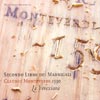Monteverdi Madrigals Book 2
A valuable addition to, and a welcome reissue for, a fine Monteverdi cycle
View record and artist detailsRecord and Artist Details
Composer or Director: Claudio Monteverdi
Genre:
Vocal
Label: Glossa
Magazine Review Date: 3/0
Media Format: CD or Download
Media Runtime: 137
Mastering:
Stereo
Catalogue Number: GCD920927

Tracks:
| Composition | Artist Credit |
|---|---|
| Madrigals, Book 7 (Concerto: settimo libro de madr |
Claudio Monteverdi, Composer
(La) Venexiana Claudio Cavina, Alto Claudio Monteverdi, Composer |
Composer or Director: Claudio Monteverdi
Genre:
Vocal
Label: Glossa
Magazine Review Date: 3/0
Media Format: CD or Download
Media Runtime: 70
Mastering:
Stereo
Catalogue Number: GCD920922

Tracks:
| Composition | Artist Credit |
|---|---|
| Madrigals, Book 2 (Il secondo libro de madrigali) |
Claudio Monteverdi, Composer
(La) Venexiana Claudio Cavina, Alto Claudio Monteverdi, Composer |
Author: Fabrice Fitch
Recording the complete book is a considerable undertaking, only previously achieved by the Consort of Musicke (Virgin Veritas, nla). But Rooley’s ensemble is not quite on the form it displayed in its earlier recital of excerpts from Books 7 and 8, which has hardly aged and is well worth seeking out. In some individual cases (Paul Elliott’s breathtaking Tempro la cetra, for example) I would rate the Consort of Musicke above La Venexiana.The Italians’ free approach to rhythm is alive to the spirit of the music. Ohimé, dov’è il mio ben manages to be a set of variations on the Romanesca theme, and something else entirely: they convince you that this double-reading is precisely what Monteverdi intended. Though not everything reflects the multi-faceted Monteverdi aesthetic, the pieces that are recorded less often still shed a useful light on his working process. As the first intégrale by a modern Italian ensemble, this is a significant addition to the catalogue.
As with their recording of Book 4 (7/04), La Venexiana’s cast for Book 2 is virtually identical to Concerto Italiano’s a decade earlier. But whereas I gave the latter the edge in Book 4, here I’d tend towards La Venexiana. Concerto Italiano zip through the whole book in just under an hour, and given that the same singers take more than 10 minutes longer in the new version it is perhaps surprising that the two approaches don’t sound more different.
Claudio Cavina doesn’t fragment the text in the manner of his rival, but his more leisurely readings generate a more effective charge by lingering over Monteverdi’s climactic build-ups (as in the last line of Mentr’io mirava fiso, to mention just one instance), and he has the edge on intonation. This strikes me as the stronger of these two offerings. Monteverdi may not yet be at the mould-breaking stage of Book 7, but in nearly every piece he is already fully and compellingly himself.
Discover the world's largest classical music catalogue with Presto Music.

Gramophone Digital Club
- Digital Edition
- Digital Archive
- Reviews Database
- Full website access
From £8.75 / month
Subscribe
Gramophone Full Club
- Print Edition
- Digital Edition
- Digital Archive
- Reviews Database
- Full website access
From £11.00 / month
Subscribe
If you are a library, university or other organisation that would be interested in an institutional subscription to Gramophone please click here for further information.




